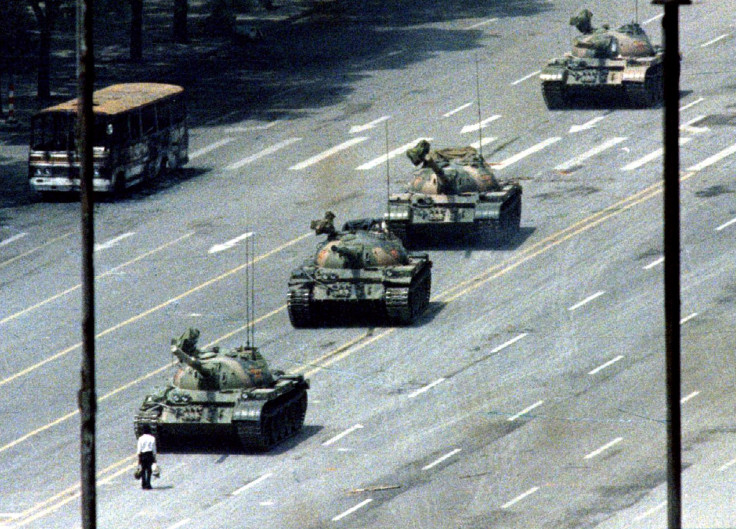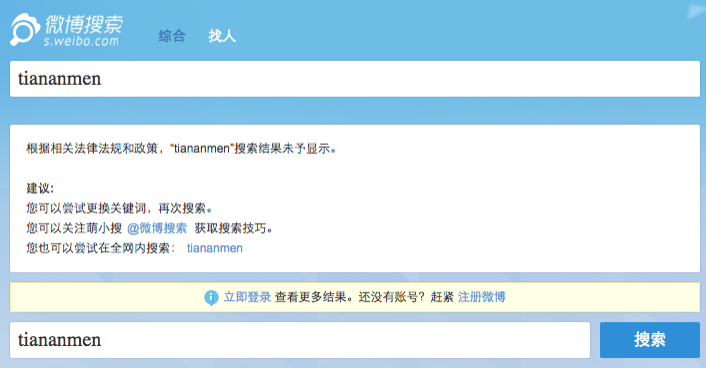Censorship In China: Which Words Are Banned From Weibo On The 26th Anniversary Of Tiananmen Square

On the 26th anniversary of the Tiananmen Square protest in Beijing, International Business Times took an in-depth look at China’s online censorship by analyzing a crowdsourced list of sensitive words that were censored on Sina Weibo, the country’s most popular microblogging service.
In the spring of 1989, student-led demonstrators demanding political reforms by the Communist Party of China flooded the capital’s iconic square, their numbers swelling to 1 million and occupying the area for over seven weeks. The government responded by ordering soldiers and tanks to forcibly clear the square amid widespread resistance. The official death toll announced by the Chinese government was 241 civilians and soldiers; however, initial reports (which were immediately retracted) from the Chinese Red Cross state over 2,600 deaths in the resulting bloodshed. The Chinese government has attempted to erase those events from the memory of its people by censoring discussions, books, media programs and digital content related to the protest.
The government closely monitors citizens who do not toe the line offline as well. Before resorting to arrest and indictment, security officials invite dissidents for an interview commonly known as a “tea session,” during which advice and warnings are given. People who’ve been invited for “tea” range from ordinary citizens who merely reposted sensitive information online to celebrities who’ve expressed support for press freedom.
The Tiananmen censorship has been so successful that, according to Louisa Lim, author of “The People's Republic of Amnesia: Tiananmen Revisited,” only 15 out of 100 Beijing university students she interviewed could recognize the “tank man” photo, which is the global symbol of the bloody crackdown.
The words and phrases on the crowdsourced list used by IBTimes in this report were submitted by Weibo users who found that no result was returned when they searched for those words on Weibo. IBTimes focused on the 1,188 words collected since January 2013, when China’s president Xi Jinping took the helm of the Communist Party and the state, until this week, when millions of people worldwide commemorated the crackdown of 26 years ago.
The analysis not only reveals valuable insights into China’s Internet censorship apparatus, which are listed in the flipcards below; it also tells the story of an enduring confrontation between the Chinese government and the country’s vibrant Internet community.

Unsearchable words: This screenshot from the Weibo search engine returned a message that reads, "According to the relevant laws, regulations and policies, the search results of 'tiananmen' cannot be displayed."
The dataset comes from a crowdsourcing project by China Digital Times (CDT), a news website focusing on Internet censorship in China, founded by Xiao Qiang, adjunct professor at the University of California at Berkeley. CDT asked Internet users to submit “sensitive words” censored by Sina Weibo, China’s Twitter equivalent, which had 281 million users as of June 2013, according to government figures. “Sensitive words” are words whose search results are banned on the microblogging service. CDT then verified them before posting to its online open spreadsheet that was updated weekly.
It should be noted that this dataset is not exhaustive as the words are merely those found and submitted by Internet users at different periods of time. We believe there were many other words censored by the authorities.
What you need to know
Creative netizens tried to circumvent the censorship by using alternative words to allude to sensitive issues, but many were detected by the censors. As the Tiananmen Square protest, which happened on June 4, 1989, is popularly known as the "six four incident," those trying to get around the censors used different number combinations to suggest the incident, such as "35" (May 35), "63+1", "65-1", "89" (year 1989), "viiv" (64 in Roman numerals) and "eight squared" (八的平方), but all failed. Even the English word "June" was blocked.
Weibo users also used phrases like "占占点" and "占点占" that have no meaning but graphically illustrate the scenario of tanks (占) crushing protesters (灬). They were blocked as well.
A number of phrases including "Tiananmen” (天安门), "square” (广场), "eight squared" (八的平方), "89", "64", "tank" are not searchable during every year's anniversary of the Tiananmen Square protest.
The term "instagram + block” (instagram+屏蔽) was deemed sensitive on Sept. 29, 2014, the same date Instagram was blocked in China during the pro-democracy protests in Hong Kong. "Cable TV + infiltrate” (有线电视+入侵) was blocked on Aug. 1, 2014, shortly after a Wenzhou cable television service was hacked to display pro-democracy messages on-air.
Weibo users found that some English words returned no results on the search page, including “umbrella revolution,” which refers to the pro-democracy protests in Hong Kong; “Citizens + Movement” that refers to a civil rights movement in China called New Citizens' Movement; “Tiananmen” and “June,” both related to the Tiananmen Square protest anniversary.
Words like "candle" (蜡烛), "today" (今天), "tomorrow" (明天), "that year" (那年) and "that day" (那天) were blocked during the Tiananmen Square protest anniversary. "Helicopter" (直升机) was censored in early May 2013 because the police deployed a helicopter to monitor a protest rally demanding transparent investigation on the mysterious death of Anhui migrant Yuan Liya.
Several brands became unintended victims of the censorship, including "Da Hun Jun" (大荤君), a yogurt drink that was taken off the shelves apparently because the name is pronounced like the words for "fatuous ruler" in Chinese.
"Prince Qing of First Rank" (庆亲王), the title of a prince of the Qing Dynasty, was blocked after the party’s internal disciplinary body published an anti-corruption article about the prince, who lived an extravagant lifestyle. The article sparked speculation that former vice president Zeng Qinghong (曾庆红) would be investigated for corruption as their names share the same character, Qing.
When China’s first lady Peng Liyuan was photographed in June 2013 snapping a picture using an iPhone, phrases including "Peng + cell phone" (彭+手机), "Peng + Apple" (彭+苹果), "First Lady + iPhone" (第一夫人+iPhone) and even her name in English "Peng + Liyuan" were on the censors’ list.
As the 100th birthday of Chinese President Xi Jinping"s late father, Xi Zhongxun, on Oct. 15, 2013, approached, search terms like "Xi + family" (习+家族), "Xi Zhongxun + son" (习仲勋+儿子) and the names of other Xi family members were blocked.
President Xi Jinping launched a nationwide crackdown on government corruption when he took over the office in March 2013. Among the high-ranking officials who have been brought down are former security chief Zhou Yongkang. But it’s been questioned whether Xi’s anti-corruption campaign was a sign of actual political reform or a political maneuver to persecute his rivals in the Communist Party.
The surnames of both President Xi Jinping and his predecessor, Hu Jintao - “习胡” (Xi Hu) and “胡习” (Hu Xi) -- that are commonly used to refer to the two politicians -- were among the censored words during the power transition between them in March 2013.
The name of former premier Zhu Rongji (朱榕基) was blocked on March 18, 2015, after a news report claimed he had criticized former vice president Zeng Qinghong in a party meeting. Another general political phrase, “Xi Jinping era” (习近平时代), was prohibited in early April 2015 probably due to the ongoing anti-corruption campaign launched by Xi.
Why were they censored?
Internet censorship in China is regulated by the State Internet Information Office, an agency within the Publicity Department. Internet companies such as Sina Corp., which owns Weibo, are required to cooperate with the agency to censor Internet content generated by users. The censored words and the reasons for censorship were never disclosed.
However, a Reuters report published in September 2013 sheds light on the scenes behind the censorship. The news agency interviewed four former censors hired by Weibo to monitor and remove sensitive content on the social media platform.
According to them, each Weibo post was scanned by a computer system before being published, and those marked as sensitive were passed to censors, who would manually approve or delete them.
IBTimes researched each blocked phrase on the crowdsourced list to find the reasons, often news reports or articles, that triggered the censorship. To give a bigger picture on the nature of censorship, we categorized the possible reasons behind each censored phrase into eight groups.
- Dissident: Actions taken against, or news related to, dissident individuals or groups.
- Political Incidents & Issues: Issues and incidents that are political in nature, such as attacks by minority or terrorist groups, court decisions, party meetings, political speeches and rumors.
- Tiananmen: Issues, individuals and news related to the 1989 Tiananmen Square protest.
- Protest: Protests or demonstrations held in China and the actions against them.
- Censorship: General criticism against the government, and issues related to media censorship in China.
- Scandal & Corruption: Disciplinary and corruption investigations that involve Chinese politicians.
- Politician: Criticism or satire against politicians and political issues of which politicians are the focus. However, scandal and corruption investigations against politicians are categorized as "Scandal & corruption."
- Others: Issues that don't fit in any category above and censored words for which a reason for censorship could not be found.
The most popular on censored list
IBTimes also labeled sensitive words that refer to or suggest Chinese politicians. Current Chinese President Xi Jinping was the most-mentioned politician due to his position as the top leader in the country and the anti-corruption campaign he launched after taking power in March 2013.
The campaign, seen by some as a maneuver to remove his political rivals in the party, has put many high-ranking officials behind bars or under investigation. The names of these fallen politicians and issues related to them became popular search terms in Weibo when they were investigated or rumored to be probed, resulting in these words getting blocked. The big names included former security chief Zhou Yongkang, former Chongqing’s Party Secretary Bo Xilai, and Ling Jihua, the former political adviser to former President Hu Jintao.
Several former top leaders were also among the most discussed politicians on the censored list including former Premier Wen Jiabao and China’s founding father and first president, Mao Zedong.
Mouseover each bubble to see more information about the politician.
Dig Deeper
If you want to dive into the censored world of Weibo, the table below lists each censored word with its English translation and censored date. Click on the header to sort the table and filter the table by typing search terms in the top-right search box.
IBTimes researched each word to find the possible reason behind the censorship. Clicking on the link for each word will take you to a page that explains the reason or shows the related news report. If a word has no link, it means we could not find information related to the word during the censored period.
Note: There was no data from October 2014 to January 2015. CDT told IBTimes that its monitor system was experiencing technical glitches during that period after Weibo changed its system. The issues were fixed subsequently.
© Copyright IBTimes 2024. All rights reserved.





















